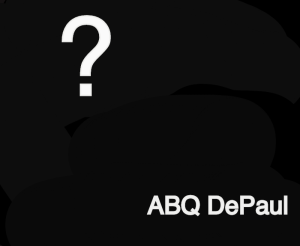DePaul freshman Charlotte Mukahirn gives us her reflection following her experience with the university’s Ask Big Questions event on January 16th, 2014. Ask Big Questions is an initiative of Hillel: The Foundation for Jewish Campus Life in partnership with the Einhorn Family Charitable Trust that aims to foster understanding through better conversation.
Upon entering the conference room, I had only expected to discuss one question with the attendees of ABQ: “What will you do differently this year?” I had thought about the question to some extent beforehand, but my answer was still up in the air. Soon enough, people began to file in through the door. I could spot a few familiar faces, but at least half were unknown to me. We were asked by the leaders of the group, Sam and Joel, to arrange the chairs into a large circle while they set up their presentation. At first, a slight panic struck me. I’m going to be speaking in front of so many people. In reality, the group consisted of perhaps fifteen to eighteen people. But, for someone with social anxiety (like me), the number was a bit daunting. Then, Joel and Sam began the discussion by walking us through the guidelines for the night’s meeting. The rules were simple: Be respectful, give each person their time to talk, and if someone happens to offend you, don’t be afraid to let them know how and why their words affected you. Afterward, a short icebreaker took place in which each person told the group their name, major, and a change that happened to them recently. An atmosphere had already begun to form in which we felt comfortable sharing the highlights of our break, or even the lowlights. Familiarity spread about the room like ripples in a pond until we were all ready to move on. Then, Joel pulled up a document on the screen.
“Take a moment and read through this,” he said, “and then find someone near you to discuss which parts of this passage stick out to you.” Simple enough. The title and author of the passage escape me now, but it generally stated which actions people commit that are damaging to their happiness. Actions like hiding your talents from the world, working jobs that violate your values, and silencing yourself for fear of criticism were among many of the actions presented in the passage. Afterward, we broke off into either pairs or small groups to discuss what we had just read. Surprisingly, the conversations began to flow almost effortlessly. Everyone in the room could connect to some part of the passage and had experiences to share with the group. After a few minutes, we merged back into our circle and began to share. Each person had their own insights, a new perspective to bring to the table. The conversation shifted from only discussing the passage to divulging experiences from our own lives in which we had been frozen with fear and doubt. Nearly everyone could recall a time in which they had restrained their true selves for fear of being criticized or mocked. But then there were also those who had overcome their fears and realized that our reluctance stems from nothing more than internalizing our doubts. Eventually, we arrived at a conclusion: our assumption that the people around us will react negatively to our true selves holds us back from being happy. And, people generally are not that volatile when confronted with differing opinions. Miscommunication is at the root of our negativity, and having a dialogue is the cure. We finished our discussion with the question, “What will you do differently this year?” and then called it a night. As we left, everyone seemed to feel more at ease, confident, and even relieved.
